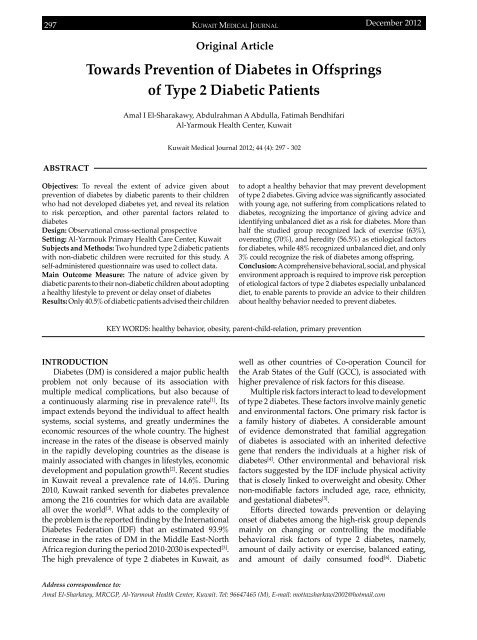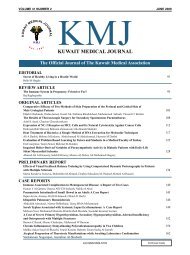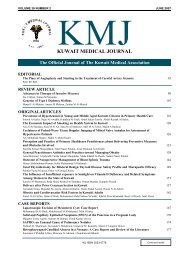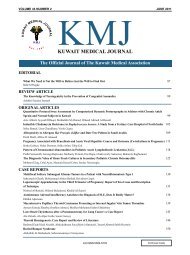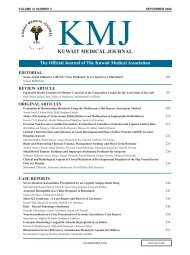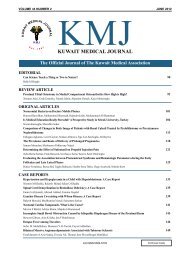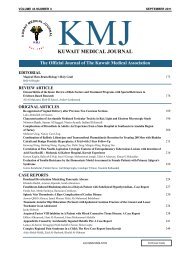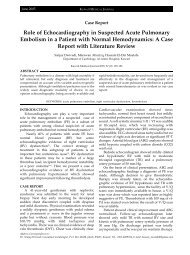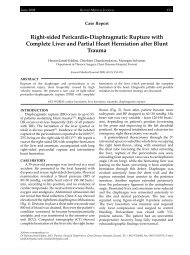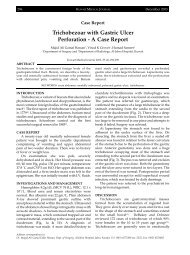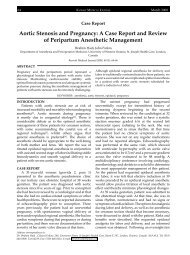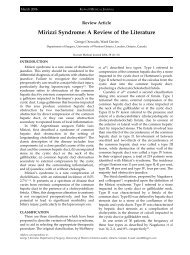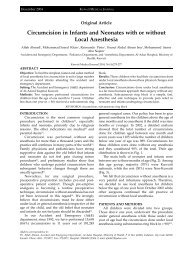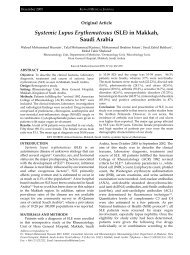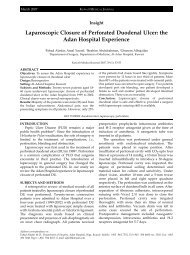Vol 44 # 4 December 2012 - Kma.org.kw
Vol 44 # 4 December 2012 - Kma.org.kw
Vol 44 # 4 December 2012 - Kma.org.kw
You also want an ePaper? Increase the reach of your titles
YUMPU automatically turns print PDFs into web optimized ePapers that Google loves.
297<br />
KUWAIT MEDICAL JOURNAL<br />
<strong>December</strong> <strong>2012</strong><br />
Original Article<br />
Towards Prevention of Diabetes in Offsprings<br />
of Type 2 Diabetic Patients<br />
Amal I El-Sharakawy, Abdulrahman A Abdulla, Fatimah Bendhifari<br />
Al-Yarmouk Health Center, Kuwait<br />
Kuwait Medical Journal <strong>2012</strong>; <strong>44</strong> (4): 297 - 302<br />
ABSTRACT<br />
Objectives: To reveal the extent of advice given about<br />
prevention of diabetes by diabetic parents to their children<br />
who had not developed diabetes yet, and reveal its relation<br />
to risk perception, and other parental factors related to<br />
diabetes<br />
Design: Observational cross-sectional prospective<br />
Setting: Al-Yarmouk Primary Health Care Center, Kuwait<br />
Subjects and Methods: Two hundred type 2 diabetic patients<br />
with non-diabetic children were recruited for this study. A<br />
self-administered questionnaire was used to collect data.<br />
Main Outcome Measure: The nature of advice given by<br />
diabetic parents to their non-diabetic children about adopting<br />
a healthy lifestyle to prevent or delay onset of diabetes<br />
Results: Only 40.5% of diabetic patients advised their children<br />
to adopt a healthy behavior that may prevent development<br />
of type 2 diabetes. Giving advice was significantly associated<br />
with young age, not suffering from complications related to<br />
diabetes, recognizing the importance of giving advice and<br />
identifying unbalanced diet as a risk for diabetes. More than<br />
half the studied group recognized lack of exercise (63%),<br />
overeating (70%), and heredity (56.5%) as etiological factors<br />
for diabetes, while 48% recognized unbalanced diet, and only<br />
3% could recognize the risk of diabetes among offspring.<br />
Conclusion: A comprehensive behavioral, social, and physical<br />
environment approach is required to improve risk perception<br />
of etiological factors of type 2 diabetes especially unbalanced<br />
diet, to enable parents to provide an advice to their children<br />
about healthy behavior needed to prevent diabetes.<br />
KEY WORDS: healthy behavior, obesity, parent-child-relation, primary prevention<br />
INTRODUCTION<br />
Diabetes (DM) is considered a major public health<br />
problem not only because of its association with<br />
multiple medical complications, but also because of<br />
a continuously alarming rise in prevalence rate [1] . Its<br />
impact extends beyond the individual to affect health<br />
systems, social systems, and greatly undermines the<br />
economic resources of the whole country. The highest<br />
increase in the rates of the disease is observed mainly<br />
in the rapidly developing countries as the disease is<br />
mainly associated with changes in lifestyles, economic<br />
development and population growth [2] . Recent studies<br />
in Kuwait reveal a prevalence rate of 14.6%. During<br />
2010, Kuwait ranked seventh for diabetes prevalence<br />
among the 216 countries for which data are available<br />
all over the world [3] . What adds to the complexity of<br />
the problem is the reported finding by the International<br />
Diabetes Federation (IDF) that an estimated 93.9%<br />
increase in the rates of DM in the Middle East-North<br />
Africa region during the period 2010-2030 is expected [3] .<br />
The high prevalence of type 2 diabetes in Kuwait, as<br />
well as other countries of Co-operation Council for<br />
the Arab States of the Gulf (GCC), is associated with<br />
higher prevalence of risk factors for this disease.<br />
Multiple risk factors interact to lead to development<br />
of type 2 diabetes. These factors involve mainly genetic<br />
and environmental factors. One primary risk factor is<br />
a family history of diabetes. A considerable amount<br />
of evidence demonstrated that familial aggregation<br />
of diabetes is associated with an inherited defective<br />
gene that renders the individuals at a higher risk of<br />
diabetes [4] . Other environmental and behavioral risk<br />
factors suggested by the IDF include physical activity<br />
that is closely linked to overweight and obesity. Other<br />
non-modifiable factors included age, race, ethnicity,<br />
and gestational diabetes [5] .<br />
Efforts directed towards prevention or delaying<br />
onset of diabetes among the high-risk group depends<br />
mainly on changing or controlling the modifiable<br />
behavioral risk factors of type 2 diabetes, namely,<br />
amount of daily activity or exercise, balanced eating,<br />
and amount of daily consumed food [6] . Diabetic<br />
Address correspondence to:<br />
Amal El-Sharkawy, MRCGP, Al-Yarmouk Health Center, Kuwait. Tel: 96647465 (M), E-mail: mottazsharkawi2002@hotmail.com


